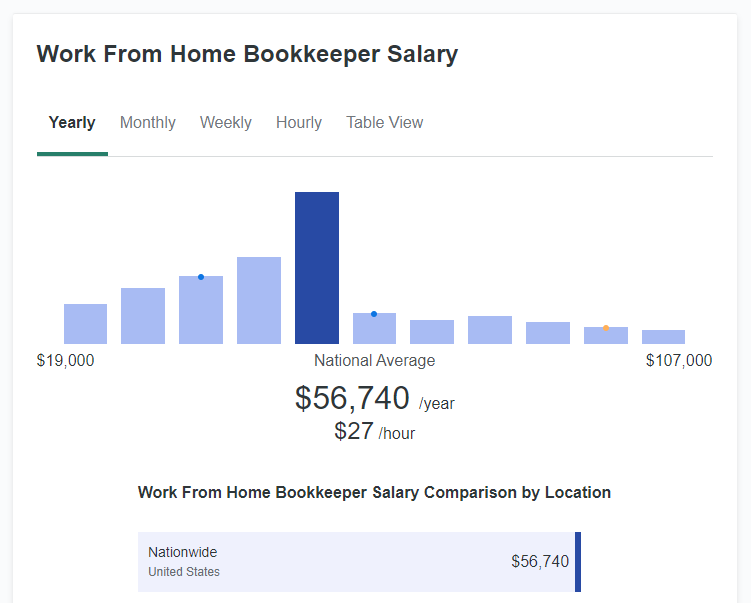Did you know that bookkeeping is one of the most profitable small businesses?
And the good thing about pursuing this career is that you do not necessarily need experience or a degree.
If you are interested in numbers, I’d advise you to go for it. There are so many ways you can learn how to do bookkeeping.
What’s more? There is a demand for bookkeeping services. Both small and large businesses need a bookkeeper.
So, if you acquire this skill and market yourself effectively, you will land clients.
You can also do bookkeeping remotely, offering your bookkeeping skills virtually.
What does a bookkeeper do?

There often needs to be more clarity between bookkeepers and accountants. These two professions are different.
For instance, you must have a certification or a degree to become an accountant. You don’t need all these to become a bookkeeper.
Accountants are not involved in the day-to-day financial activities of a business. They mainly do financial statement audits and prepare taxes.
On the other hand, bookkeepers are involved with a business’s financial health daily. They can pay bills, receive receipts, and collect payments.
If you become a bookkeeper, you’ll be responsible for the money in and out of business.
Some of the responsibilities that bookkeepers have include:
- Collect and record financial details for incoming and outgoing accounts.
- Generate various financial reports
- Monitor financial records for accuracy and discrepancy
- Handle payroll
- Generate and pay invoices
- File tax returns
Bookkeepers can handle some or all of the tasks mentioned above or more. The job description is dependent on the skills of the professional and client requirements.
Can you become a bookkeeper with no experience?
Yes, you can become a bookkeeper with no prior experience.
You become a bookkeeper without experience by learning the skills and tools experienced bookkeepers have.
There are many schools and online courses available to gain knowledge. You can also obtain a bookkeeping certification to increase your chances of securing a job in the field.
Although many employers prefer to hire candidates with experience, some are willing to provide on-the-job training to individuals who demonstrate a strong work ethic and a willingness to learn.
How to be a bookkeeper using traditional education

The traditional education system to become a bookkeeper involves obtaining a degree or diploma in accounting or bookkeeping from an accredited institution.
The institutions vary from community colleges, vocational schools, or universities.
My findings show that the common courses in a bookkeeping program include accounting principles, payroll accounting, financial statement analysis, and taxation.
With traditional education, you also stand a better chance when you add a certification to your diploma or degree.
Several bookkeeping bodies offer certification such as the Certified Bookkeeper (CB) designation from the American Institute of Professional Bookkeepers (AIPB)
Another great example is the Certified Public Bookkeeper (CPB) designation from the National Association of Certified Public Bookkeepers (NACPB).
Can you get Bookkeeper certifications online?
Bookkeeping organizations offer several bookkeeping certifications in different parts of the world.
They require you to complete their coursework and pass an exam to demonstrate your proficiency.
The requirements vary and depend on levels of education, but you can get certified even as a beginner with bookkeeping.
The most popular certifications include:
- The Certified Bookkeeper (CB): The American Institute of Professional Bookkeepers (AIPB) offers this American Institute of Professional Bookkeepers (AIPB).
- The Certified Public Bookkeeper (CPB): It is a certification from the National Association of Certified Public Bookkeepers (NACPB).
- Intuit Bookkeeping Certification: It is a certification offered by Intuit. The certification provides foundational bookkeeping skills to work with QuickBooks.
Organizations worth considering that offer certifications if you are in the United Kingdom and Canada are:
- Certified Professional Bookkeepers of Canada (CPB Canada)
- Canadian Bookkeepers Association (CBA)
- The Institute of Certified Bookkeepers (ICB) – UK
- The Association of Accounting Technicians (AAT) – UK
What skills are required for a virtual bookkeeper?
To be a successful virtual bookkeeper, you need to have specific skills.
They include:
- Attention to detail
- Credibility, honesty, and diligence
- High organization
- Time management
- Communication skills
- Ability to work independently and meet deadlines
- Familiarity with bookkeeping software and programs
How much can I earn as a bookkeeper at home?

The amount of money you can earn as a bookkeeper at home can vary depending on different factors.
Your experience, geographic location, the specific services offered, and number of clients you have are the main factors.
According to ZipRecruiter, the average pay for bookkeepers who work from home in the United States is $56,740 per year.
This translates to approximately $27.28 an hour and $4,728 a month. You can calculate your potential income from these figures based on the hours you’d want to work.
The opportunity as a work-from-home bookkeeper is unlimited, and you may be able to command higher hourly rates when you specialize and position yourself as an expert.
Drawing from experience, as a self-employed bookkeeper working from home, you are free to set your rates and adjust them as needed to reflect changes in demand or your level of experience.
What are the benefits of working as a bookkeeper from home?
There are numerous benefits to working as a bookkeeper from home. They include:
- Flexibility to set your rates, schedule, and work around other commitments.
- Unlimited and decent potential income working from home
- No commute, thus avoiding the time and expense of commuting to an office.
- Lower overhead as you don’t pay for office space, equipment, or other expenses associated with running a physical business.
- Working from home allows you to take on clients from anywhere worldwide, increasing your potential client base.
- Improved work-life balance as you can better balance your work and personal life, reducing stress and improving overall well-being.
How to Become a Bookkeeper at Home

Step 1: Get basic training in bookkeeping
As is with any kind of business, you need to get basic training in bookkeeping.
Such training should enlighten you on what bookkeeping is, how it is done, the tools you need, how to get clients, and how to be a successful bookkeeper, among other important details.
Fortunately, today, there are so many ways you can learn about bookkeeping. First, you can take advantage of the internet.
There is so much information about bookkeeping on platforms such as YouTube.
Here, you will find comprehensive tutorials on bookkeeping, how to do it, how to set up efficient bookkeeping systems and how to close deals, and so much more information.
You can also take up an online course about bookkeeping. Some courses are free, while others have to pay a certain amount.
Great options are courses on Udemy or the Bookkeeping Course by Tiffani Higgins.
When selecting a course, look at the outline to determine if it is comprehensive.
Depending on many factors, such as your grasping ability and desire to become a good bookkeeper, you might have to do a lot of courses.
You want to gain the knowledge and skills required to succeed in this career path.
Along with the training, you must have the skills discussed to set you up for success.
Step 2: Get your work tools ready as a bookkeeper
Now that you have gained the necessary skills to do bookkeeping, you next want to have your tools ready.
The standard tools you must have include a computer and an internet connection. Of course, you will store your client’s files here and maybe communicate with them online.
It would be best if you also had bookkeeping software. Such software will make your work easier while managing your client’s finances.
There are many bookkeeping software. They vary in functionality, capabilities, and pricing, among the most popular accounting software, including QuickBooks Online, FreshBooks, and Xero.
You choose the best based on the bookkeeping goals of your client’s business. You might also consider
When starting, you don’t need very advanced bookkeeping software. Get one that is affordable and can get the job done.
Other tools that you will need include a mobile phone or landline to reach your clients or team members.
In the beginning, you can use your phone even though this is one of the non-phone work-from-home jobs. However, your goal, in the long run, should be to separate your business and personal communications. This makes life easier for you as an entrepreneur.
Step 3: Launch your bookkeeping business

You have the bookkeeping tools and skills, now you can help clients solve their bookkeeping problems.
It’s time to launch your business officially.
First, could you get the necessary licensing required to run this business, e.g., a business permit? These vary based on your location.
Secondly, select a structure for your business. You can run it as a sole proprietorship, a partnership, a limited liability company, etc.
If you run the business alone, you will have full control over it. If you decide to partner with someone, ensure that they understand your business in terms of the value that you want to offer.
A good business partner, in this case, would understand bookkeeping and is committed to seeing your company grow.
Finally, register your business or company. Registering your business has several advantages. It makes it possible to get bank accounts and loans and build a good customer reputation.
You don’t need a physical location if you are a virtual bookkeeper. You can offer these services from the comfort of your home or in a convenient location.
Otherwise, you need to find an ideal physical location, i.e., an office, and run your business from there.
This might be an expensive option considering that you must pay for the office, equip it, pay the operating bills, have staff, etc.
As you launch your business, you also need to consider your pricing.
Some factors to consider are your level of expertise, the bookkeeping needs of a company, your expenses in delivering the services, and customer lifetime value, among others.
You could set your hourly rates or have packages defining different kinds of services at certain rates.
Step 4: Create a bookkeeping services website
You want to set yourself as a bookkeeper who knows what they are doing and can be relied on by businesses to help with their finances.
A website will help you communicate the skills you can offer and every quality that gives you a competitive advantage over other bookkeepers.
A website is also ideal if you want to work as a virtual bookkeeper. You will not necessarily have to meet clients individually if you offer your services virtually.
This will give you the freedom to work for many clients at a go and the ability to balance your work and personal life.
Your website should contain all the details that potential clients need to know. Some of these details include:
- Services that you can provide
- Your unique value proposition
- The packages
- Your areas of specialty
- Testimonials from clients
- A contact form
Setting up a website is easy. You can create a website yourself by using my guide or hire a web developer to do it for you.
Other charges you might incur while establishing your website include hosting and buying a domain name.
You also need content on your website. You can learn all these things on your own. If you don’t have the time, hire me to create a modern website.
Step 5: Market your business and pitch clients

Now that you have established your business, it is time to market it.
You might have the best bookkeeping skills and services, but if people don’t know about you, they will not hire you. As such, it is important to market your business.
Your marketing goals, in the beginning, should be to create awareness about your business and have people contacting you for the same.
As you continue to conduct the business, you want to attract as many clients as possible and retain them for a long time.
You need to come up with a marketing strategy. You can start by defining who your target clients are.
Who exactly do you want to render your services to? Is it small, mid-sized, or large organizations? Are there specific industries that you want to deal with?
When marketing your bookkeeping business, you should focus on communication to your competitive advantage. Let potential customers know they can rely on you for their bookkeeping needs.
Here are some of the ways that you can market your business:
1) Social media
Social media platforms such as Facebook, Instagram, LinkedIn, and Twitter have become great tools for marketing businesses.
All you need to do is create profiles on different platforms and let potential know the services that you can offer them.
You don’t need to be on all these platforms; you can start with one and add more as you continue.
2) Cold emails
You can just send emails to potential clients letting them know that you can do bookkeeping for their businesses.
Search on the internet or look around your area to see businesses you think might need your bookkeeping services and write to them.
The pitches must be good enough for potential clients to hire you.
3) Networking
You need to connect with people who are in this bookkeeping industry. They might not necessarily give you jobs, but if you prove good at what you do, they might refer you to clients.
They can consider you when they have a lot of work to do with tight deadlines. You could also learn from them;
how they started their business, got clients, and became successful. This is how you build your business.
4) Word of mouth
You can also rely on word of mouth to market your business.
Tell your friends and family members about the bookkeeping services that you can provide. Ask them to spread the word about your business.
This may not be a reliable marketing technique, but if you do it alongside the rest, you will have done a great job creating awareness about your business.
5. Offering free services
With a portfolio of the businesses you have worked with before, it might be easier for clients to trust that you can deliver.
So, you might want to consider offering your bookkeeping services for free or at a discounted price.
You can approach businesses in your area and do bookkeeping services for them for a few months.
If your services are excellent, they might consider hiring you afterward or refer you to other business owners.
Step 6: Keep learning and perfecting your bookkeeping skills
Most importantly, you must keep learning about bookkeeping and perfecting your skills.
As you do business, you will know exactly what clients want. Aim at attracting long-term and high-paying clients. The only way to do this is by being perfect at what you do.
To improve your skills, you can have mentors in this field.
You should read books, watch documentaries and tutorials and take courses in bookkeeping. I would also like you to be updated on trends in this area.
Moreover, keep on improving yourself. Build a good reputation with your clients, be trustworthy, and be someone who can be relied on to help businesses with their bookkeeping needs.
Transparency and integrity are qualities that will make you successful as a bookkeeper.
Where can you find remote bookkeeping jobs?
You must find clients now that you have everything to run a bookkeeping business.
As I said earlier, you can send cold emails to potential clients.
You can also join online freelance marketplace sites like Fiverr. Here you will find bookkeeping jobs, either temporary or long-term jobs.
There are also many platforms to find remote booking jobs, with some specializing in bookkeeping and accounting.
The popular places to find opportunities include:
1) Indeed
Indeed is a popular job search website with millions of online job opportunities.
Job seekers can find jobs by keyword, location, salary, and other criteria.
It also provides information on company reviews and salaries.
Indeed offers many remote bookkeeping jobs, and you can apply for jobs directly on the website.
2) FlexJobs
Its website specializes in remote and flexible work-from-home opportunities, including bookkeeping jobs.
FlexJobs requires job seekers to pay a membership fee, but in exchange, they provide a curated list of job opportunities screened for legitimacy.
3) Upwork
Upwork is a freelance platform where clients post jobs, and freelancers can bid on them.
Freelancers can set their rates and work schedules, and the platform provides tools for tracking time and payments.
Upwork also has a marketplace where you can create catalogs of your bookkeeping services for clients to purchase.
4) LinkedIn
This professional networking platform is a great place to search for remote bookkeeping jobs.
You can search for jobs by keyword, location, and other criteria.
LinkedIn allows you to create a profile to showcase your skills and experience and connect with potential employers.
5) Remote.co
This website is dedicated to remote work opportunities.
Remote.co offers job listings, advice, and resources for people looking to work remotely.
6) Accountingfly
This website specializes in accounting and finance jobs. Accountingfly partners with employers to provide job listings and recruitment services.
7) Intuit
Intuit offers bookkeeping software and services.
It provides various accounting and bookkeeping services for companies, small businesses, and individuals.
The company also hires remote bookkeepers for their team.
8) Robert Half
This staffing and recruitment agency offers positions in law, finance, and technology, among other industries.
Robert Half is one of the largest staffing agencies in the world and has a range of job opportunities for bookkeepers.
9) Social media platforms
You can also find remote bookkeeping jobs on social media platforms like Twitter, Facebook, and Instagram.
Employers and recruiters post job opportunities and use hashtags to promote various opportunities.
Social media platforms also provide platforms to showcase your skills and attract relevant clients.
Tips to Succeed as a virtual bookkeeper
1) Stay organized
As a virtual bookkeeper, you will work with multiple clients simultaneously.
You need to be organized to efficiently handle client records, handle work with different deadlines, and create a system for tracking expenses and invoices.
This will help you prioritize your workload and provide excellent client service.
2) Specialize in a specific niche.
Our investigations demonstrate that specializing in a specific niche enables you to differentiate yourself from general bookkeepers.
Your specialized knowledge and expertise can generate a higher demand for your services and higher fees.
3) Communicate effectively
Clear and concise communication is key to success as a bookkeeper working from home.
Please reach out to your clients to ensure you have the relevant information you need to handle your work.
I would also like you to respond to your client's questions and concerns and keep them updated on the status of their financial records.
4) Build a strong network.
Networking is important in any field.
Building a strong network can help you find new clients and connect with other professionals in the industry.
Networking also helps you to stay up-to-date on industry trends and best practices.
Attend networking events, join professional organizations, and connect with other virtual bookkeepers to expand your network.
5) Stay up-to-date with technology
As a virtual bookkeeper, you must be comfortable using accounting software and other technology to do your job effectively.
Stay up-to-date on the latest software and tools in the industry, and be willing to learn new skills as needed.
This will help you provide better service to your clients and stay competitive in the field.
6) Obtain relevant certifications
Relevant certifications will help you stand out and demonstrate your expertise.
These certifications require passing an exam and meeting certain education and experience requirements.
They can help you build credibility with clients and improve your earning potential.
7) Market yourself
Marketing your services helps you to build a strong online presence, establish credibility, and gain trust from potential clients.
Constantly market yourself even if you have clients.
Investing time and effort in marketing yourself can increase your visibility, generate leads, and ultimately grow your virtual bookkeeping business.
Conclusion
As you have noticed from the analysis above, you can become a bookkeeper with zero experience. You don’t need a degree.
All you need is to have the right attitude, at least love numbers, and be ready to learn.
There is a huge demand for bookkeeping services, meaning that if you position yourself well, you can make good money.
Even better, you can offer these bookkeeping services virtually.
Being trustworthy, reliable, and honest will enable you to make major achievements in this career path.

